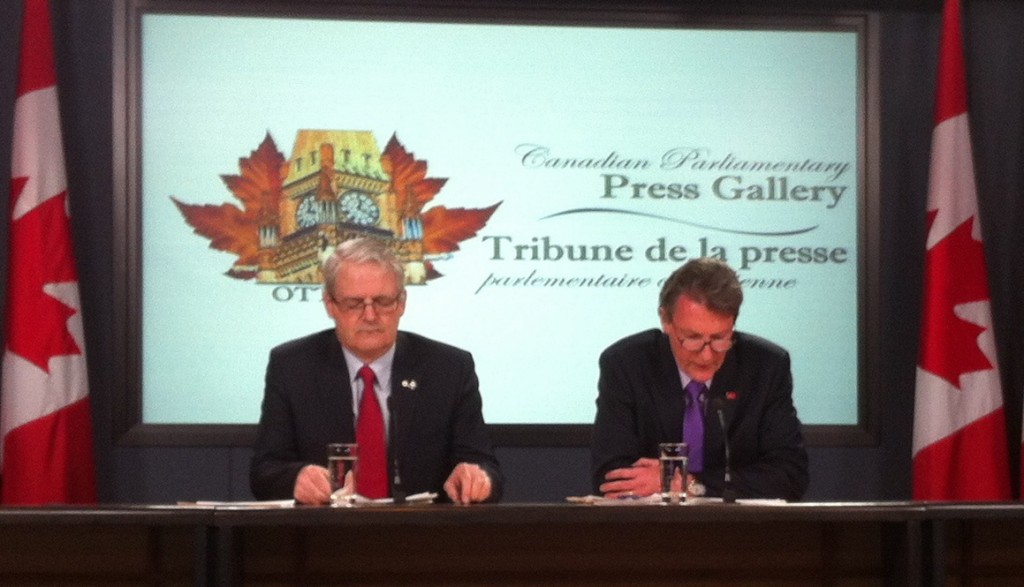In the first of two opposition press conferences on the F-35 procurement today, the Liberals were up first, with both Marc Garneau and John McKay to discuss “accounting versus accountability” with the process, in light not only of the Auditor General’s report, but the government’s defending the differences as being “a difference in accounting.” The intention had been for Bob Rae to join in by Skype, but this was prevented due to technical issues, some of which were the difficulty in shooting him on the screen behind the two MPs. Nevertheless, Garneau and McKay held their own, as Garneau launched into the Conservative government, saying that they had lied to Canadians about holding an open competition, and then lied to them on the escalating costs.
“There was nothing open and transparent about the way the Conservatives handled the procurement process,” Garneau said.
They detailed the timeline of the talking points, from how the Conservatives went from claiming that we had an ironclad contract that protected us against cost overruns, to suddenly saying we were protected because we didn’t have a contract. They also said that when you look at the total lifecycle cost, including upgrading weapons over a 36-year lifespan, plus replacement planes (of which we may need up to 14, given the rate in which CF-18s were lost), those costs start to climb “well north of $30 billion, maybe hitting $40 billion.”
They also questioned why the same ministers were being included in the new procurement secretariat when they didn’t ask enough questions in the first place, and was that an indication that the process going forward would largely be status quo. Above all, they called for the government to “stop lying, stop blaming soldiers and bureaucrats,” for Harper to resign, and to push the reset button – or perhaps more appropriately the eject button – on the entire procurement process.
In the questions that followed, they were immediately asked about Peter MacKay’s comments to the media yesterday, where he presented completely the wrong numbers from the AG report while pointing to the chart displaying them, claiming they were the PBO’s numbers when they were in fact numbers from his own department.
“Does Mr. MacKay not know how to read is the first question that I had to ask myself,” Garneau said. “Secondly, I had to go to the question of is he trying to pull a quick one on us again, hoping that the general public is not going to see us, or is he not too bright? It went through my mind, I have to admit.”
“It goes to the fact that this minister is incompetent and should not be the minister of national defence, handling some of the most expensive purchases that the government makes,” Garneau added.
They also pointed to the lack of a strategic vision that the entire procurement process rests on. Since the F-35s are good for a deep first-strike capability, is that what our foreign policy is now going to include, or does Canada maintain a supporting role that includes our fighters in a support capability as well as our ships, and so on.
Indeed, when asked if Garneau thinks that another plane is better for Canada, he said that no one plane can do everything, but since we don’t have the luxury of being able to support as many fighters in as many different roles as the Americans do, it means we have to make choices.
“For Canada, what is the primary mission of the plane that will replace the CF-18s?” Garneau asked. “For Canada clearly it is the defence of our territory – that’s what comes first. It also satisfies our needs when it comes to our NORAD operations. For this kind of plane, we need a plane that in my opinion should have two engines, the ability to work in the Canadian north and off of our coasts, because it’s not just the defence of our airspace but maritime defence as well. Next, what are doing with regard to our participation in NATO when we go abroad? We went to Bosnia and Libya. Here we have to define the capabilities we want. Do we want the capability of having a stealth fighter jet because we’re going to use it to attack? It’s very sophisticated, and it’s beneficial because you can approach targets without being detected easily, or are we going to take a secondary role in operations where we can support other multi-national forces in our air capabilities. This does not exclude the possibility of having a strike fighter against a country that doesn’t have certain capabilities. This question has to be resolved.”
Seeing as the F-35 is a single-engine plane, it would seem to not fit in with Garneau’s requirements.
Garneau also recalled his time as president of the Canadian Space Agency, and how he was subjected to an audit by former AG Sheila Fraser, and reminded the room that she was auditing process and money well spent, not the programmes themselves. With this in mind, he also said that the way we do defence procurement in this country needs to be completely revamped and overhauled.
“At the moment it involves Public Works – they manage the project,” Garneau said. “It involves DND, who is supposed to define the requirements, and it involves Industry Canada, who is supposed to look after the industrial and regional benefits. At the moment, that process in my opinion is broken. It’s not working the way it is to ensure that we give taxpayers the best value for the money that they put into government, and that is long overdue.”

